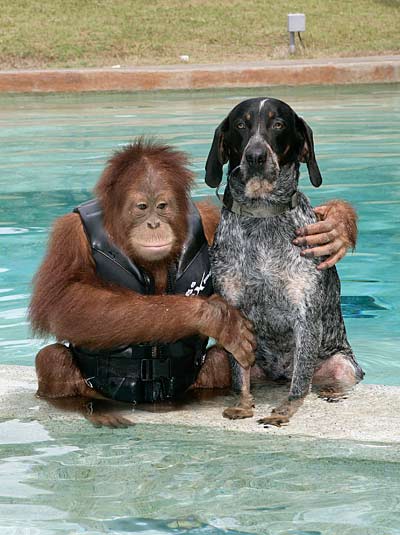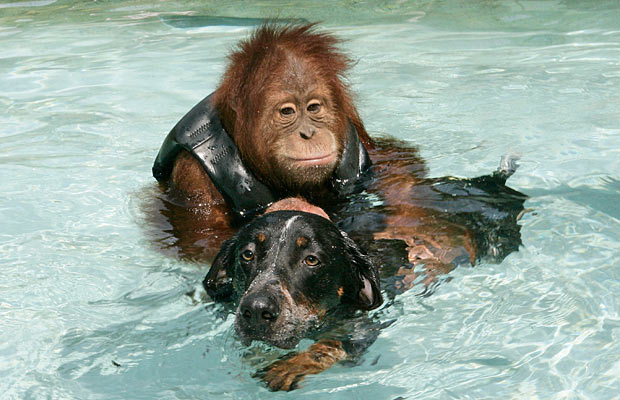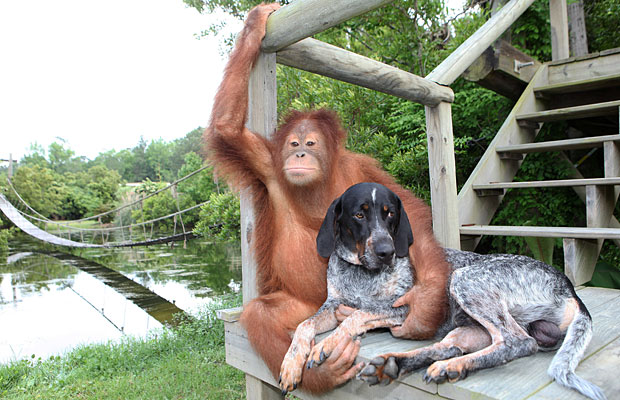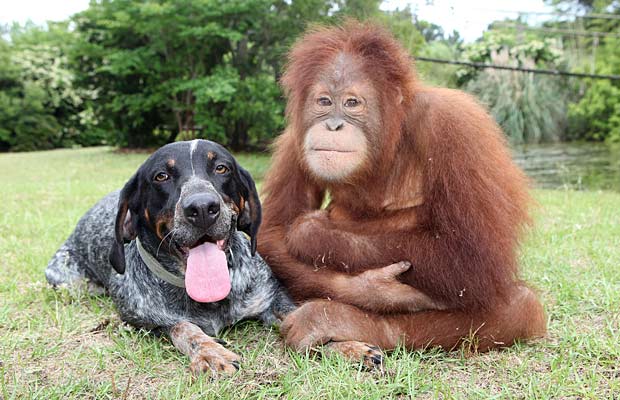Long Live Friendship!
After losing his parents, this 3 year old orangutan was so depressed he wouldn't eat and didn't respond to any medical treatments. The veterinarians thought he would surely die from sadness. The zoo keepers found an old sick dog on the grounds in the park at the zoo where the orangutan lived and took the dog to the animal treatment center. The dog arrived at the same time the orangutan was there being treated.
The 2 lost souls met and have been inseparable ever since.
The orangutan found a new reason to live and each always tries his best to be a good companion to his new found friend. They are together 24 hours a day in all their activities.

They live in Northern California where swimming is their favorite past time, although Roscoe (the orangutan) is a little afraid of the water and needs his friend's help to swim.


Together they have discovered the joy and laughter in life and the value of friendship.


They have found more than a friendly shoulder to lean on.
Written By Scott James (For NY Times)
With his golden hair and black mane, Henry, a mix of thoroughbred and quarter horse, towers 16.2 hands — roughly five and a half feet tall — at the shoulder blades. He currently enjoys a carefree existence in fields in Novato, but earlier this year he was in crisis.

Adithya Sambamurthy/The Bay Citizen. Alaura Ibanez and her adopted horse, Henry, on Wednesday at Maragus Stables in Novato. His previous owner died intestate.
“He was distraught, hyper, snorting all the time,” said Alaura Ibanez, who adopted Henry in February. “People don’t realize that horses are so sensitive.” What happened to Henry goes beyond the tale of one horse. He is a symbol of a growing problem in Marin County. In recent years there has been a surge in the number of people dying alone intestate — without a will — leaving the government to deal with what has been left behind.
Michael Smith, who has worked at the county’s public administrator office for the past three decades, has seen cases increase to as many as 120 annually, from about 15 annually 25 years ago. The county is currently managing $10 million of these assets, which includes real estate, vehicles, bank accounts and pets,” Mr. Smith said. “The workload will continue to grow.” Through probate, the county can take a part of the assets to cover expenses. But since most people leave behind problems (debts, the hunt for possible heirs), managing estates ends up costing taxpayers: $415,231 in expenses this year, with $362,650 in revenues — a loss of $52,581 to the county. Jennifer Walter, also of the public administrator’s office, said, “We’re an organization that doesn’t want your business.”
Henry was one of seven horses the county suddenly found itself caring for in January when their owner died alone without a valid will. Boarding, feeding, shoeing and medical care typically cost hundreds of dollars a month for each horse. As work horses, they were not exceptionally valuable — Henry suffered from cancer and arthritis — so the county had to find people with the resources to adopt them. “The community here is so animal conscious,” said Ms. Ibanez, who paid a $450 fee to adopt Henry and give him a new home and a new name — he was previously called Colonel. “They were adopted very quickly.”
Henry ended up in green pastures, but the situation in the county is not so rosy and may be a harbinger of a problem elsewhere. According to the census, Marin County has the oldest population of the nine Bay Area counties, with 49 percent of the residents 45 or older. That represents a tsunami of estates that will need to be settled, something about which many people are in denial. According to a recent Harris poll for Lawyers.com, 65 percent of American adults nationwide do not have wills.
Marilyn L. Geary, 65, and Jacqueline Janssen, 64, are working to lower that statistic with what might be seen as one of those only-in-Marin ideas: the equivalent of Tupperware house parties, but instead of plastic containers, they discuss death. The gatherings of about six participants are called LeaveLight Circles, based on the women’s book “LeaveLight: A Motivational Guide to Holistic End-of-Life Planning,” a spiritual, nondenominational workbook that helps people decide what they want when the end comes, including medical directives, funeral arrangements and estate planning.
“Baby boomers don’t think they’re going to die until they are 90,” said Ms. Janssen, whose parents died young without plans in place, causing dissension within her family. Ms. Geary’s late husband spent his final months towing a canister of oxygen to breathe, but there was no discussion of his death, leaving her ill prepared when the moment came. “We had no plans,” she said.
Both women see a change coming. As baby boomers deal with their parents’ deaths, they will experience the cascade of problems when there is no will. “Our parents are dying now, so it’s bringing the issues home,” Ms. Geary said, believing this could lead to an awakening about estate planning, and perhaps new approaches, like her groups. The six sessions to complete the circle cost $300. Gathering to discuss death is not as grim as it sounds, said Marcella Friel, 48, who participated last November. “At times it’s hilarious,” Ms. Friel said, describing the gatherings as upbeat and social. “At times it’s thought provoking. At times it’s overwhelming.” Ms. Friel has since led a circle of her own. “This is the generation that reinvented social conventions,” she said of baby boomers. “The final reinvention is the American way of death.”
